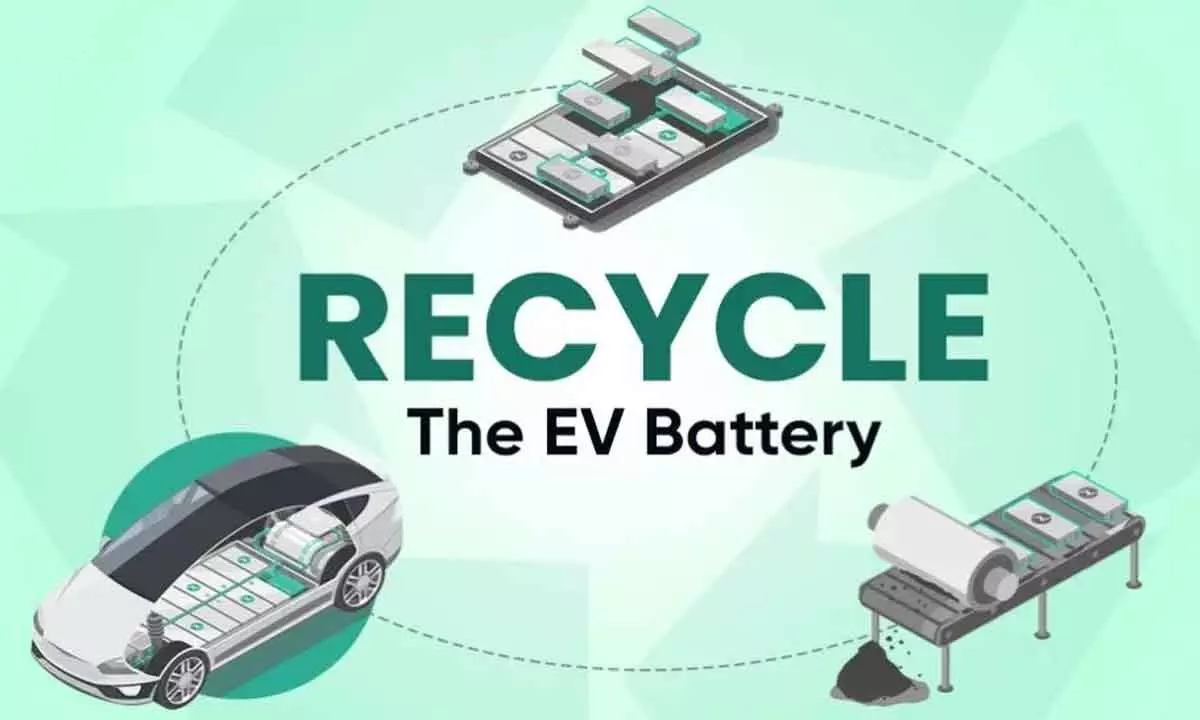India should focus on deft handling of Electric Vehicle battery recycling
A robust rejuvenation of old batteries without harming the environment gets thumbs up
image for illustrative purpose

Today, at a time when the entire world is witnessing advancements and embracing modernisations, humankind is coming to terms with the fact that the future of mobility is ‘electric’ and India is no exception. Although, the development of technology has eased our personal and professional lives, it has also exposed us to serious environmental issues that cast a doubt on our ability to survive. Various problems, including pollution, plastic waste and carbon dioxide, among others, are aggravating global warming, with repercussions felt all over the world. However, with growing environmental concerns, consumer consciousness and awareness are also increasing, almost mandating adoption of EV.
The gradual increase in demand for electric vehicles has resulted in a significant transition of the Indian automotive sector in recent years. The government's push for EV adoption, combined with rising public awareness of environmental issues, has boosted EV sales. This encouraging trend, however, comes with a catch: the eventual disposal of EV batteries.
EV batteries are complicated and contain valuable components like lithium, cobalt, nickel, and other precious metals. On the one hand, discarded batteries cause concerns such as environmental degradation and leak toxic compounds everywhere, while on the other, they squander the potential to recover these valuable resources. Furthermore, the disposal of plastic waste, landfills, and lead smelting all emit methane gas, contributing to the ‘greenhouse effect’ and other global climate changes. Thus, a robust rejuvenation framework for batteries has emerged as an ideal approach to giving any old battery a second chance while also making it safe for use in the environment.
EV battery rejuvenation-The secret to finding solutions:
Since inception, India has lacked a comprehensive recycling infrastructure for EV batteries. This is because most of the low-speed two-wheeler EVs on the road are equipped with lead-acid batteries, which pose a recycling challenge due to their intricate design and chemical composition. The absence of standardized collection, transportation, and rejuvenation processes exacerbates the issue. As a result, a significant number of used batteries end up in landfills or are disposed of in an environmentally damaging manner. Thus, recycling revival—a creative problem-solving approach that tackles the challenges of recycling EV batteries—emerges as a promising solution with various benefits.
Financial stability: The recycling revival offers a creative and promising solution to address financial problems. To be honest, batteries are large, dangerous, and electrically brittle. They also decay over time, losing their efficiency. According to the Central Electrochemical Research Institute, lead plate sulfation causes around 80% of lead-acid batteries to fail before their time. As a result, these batteries are routinely discarded and replaced, putting the environment at risk and hampering financial stability. Here, adopting battery rejuvenation techniques can ensure forward manufacturing, which helps reduce production costs and ensures that competitively priced products are available for purchase.
Batteries are easy to recycle. Batteries are now easier to dispose of and recycle than ever before. Because battery collection facilities can be found in a variety of locations, including businesses and even local supermarkets, the only thing to keep in mind is to bring a portable waste battery when out shopping or to a public place. This is where today's batteries have become simple to recycle when properly disposed of, but remember that correct storage is also required.
Environmental sustainability: It is no surprise that the production of batteries involves toxic components, including lead, nickel, steel, zinc, mercury, cobalt, lithium, and silver, to name a few. These toxic chemicals are unfortunately not only harmful to the environment but also cause serious concern for human health. Perhaps most famously, mercury causes mercury poising. Lead and cadmium are also among the more dangerous environmental pollutants. When batteries break down in landfills, the toxic materials can then leach out of the landfills and into waterways and the ocean. Each kWh of battery manufactured generates 150–200 kg of CO2, as per the Swedish Environmental Research Agency. Thus, EV batteries rejuvenation emerged as an economically and environmentally sensible option.
All things considered! It is not an overstatement that in recent years, with the adoption of EVs, the market for battery rejuvenation has also gained traction.
According to the Niti Aayog, India's EV battery recycling market will grow to 128 GWh by 2030, up from 2 GWh in 2023. This is undoubtedly fueled by an over 200% year-on-year increase in EV sales since the pandemic's termination. The surge in electric vehicle adoption in India raises hopes of reducing carbon emissions and enhancing energy sustainability. However, as the EV market expands, so does the responsible handling end-of-life batteries. To address the problem, an innovative solution to EV battery recycling has emerged to ensure that the environmental benefits of electric mobility are not undercut by improper disposal practices. Furthermore, by focusing on the positives, India can lay the framework for a sustainable and efficient EV battery rejuvenation ecosystem.
(The writer is Managing Director of Tesla Power USA)

